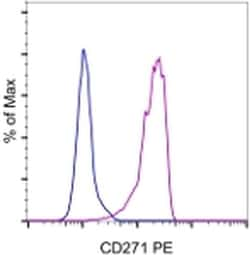Learn More
Invitrogen™ CD271 (NGF Receptor) Monoclonal Antibody (ME20.4), PE, eBioscience™, Invitrogen™


Mouse Monoclonal Antibody
Brand: Invitrogen™ 12-9400-42
Description
Description: The monoclonal antibody ME20.4 recognizes CD271, a 75 kDa, type I transmembrane protein that belongs to the low-affinity neurotrophin receptor and tumor necrosis factor receptor superfamily. CD271 is expressed by neurons, Schwann cells, melanocytes, mesenchymal stem/stromal cells, neural crest stem cells, astrocytes, oligodendrocytes, and a subset of lymphoid cells including follicular dendritic cells. CD271 binds to the ligands NGF, BDNF, NTF3, and NTF4. CD271 contains a death domain which induces apoptosis and regulates cell growth and proliferation through interactions with TRAF2, TRAF4, TRAF6, PTPN13, and RANBP9. The ME20.4 monoclonal antibody recognizes human, non-human primate, mouse, rat, sheep, rabbit, cat, dog, and pig CD271. Applications Reported: This ME20.4 antibody has been reported for use in flow cytometric analysis, western blotting, and microscopy. Applications Tested: This ME20.4 antibody has been pre-titrated and tested by flow cytometric analysis of stimulated HEK-293T cells. This can be used at 5 μL (0.25 μg) per test. A test is defined as the amount (μg) of antibody that will stain a cell sample in a final volume of 100 μL. Cell number should be determined empirically but can range from 10^5 to 10^8 cells/test. Excitation: 488-561 nm; Emission: 578 nm; Laser: Blue Laser, Green Laser, Yellow-Green Laser. Filtration: 0.2 μm post-manufacturing filtered.
Neurotrophic factors control the survival, differentiation and maintenance of neurons in the peripheral and central nervous systems, and of other neural crest-derived cell types. Developing sympathetic neurons are absolutely dependent upon nerve growth factor (NGF) during the period of target competition in vivo. Antibodies reacting specifically with NGFR p75 are useful tools in the detection and characterization of NGFR p75, to enhance our understanding of a wide range of phenomena in the development, plasticity and repair of the nervous system.
Specifications
| CD271 (NGF Receptor) | |
| Monoclonal | |
| 5 μL/Test | |
| PBS with BSA and 0.09% sodium azide; pH 7.2 | |
| P07174, P08138, Q9Z0W1 | |
| Ngfr | |
| Affinity chromatography | |
| RUO | |
| 100349095, 100525607, 101119064, 18053, 24596, 4804, 491071 | |
| 4°C, store in dark, DO NOT FREEZE! | |
| Liquid | |
| Responsibly packaged |
| Flow Cytometry | |
| ME20.4 | |
| PE | |
| Ngfr | |
| CD271; CD271 antigen; Gp80-LNGFR; LNGFR; low affinity nerve growth factor receptor; low affinity neurotrophin receptor p75NTR; LOW QUALITY PROTEIN: tumor necrosis factor receptor superfamily member 16; low-affinity nerve growth factor receptor; nerve growth factor receptor; nerve growth factor receptor (TNFR superfamily, member 16); nerve growth factor receptor, fast; NGF receptor; NGFR; NGR; p75; p-75; p75 ICD; p75 neurotrophin receptor; p75 ntr; p75(NTR); p75NGFR; p75NTR; RNNGFRR; TNFR superfamily, member 16; Tnfrsf16; TNR16; Tumor necrosis factor receptor superfamily member 16 | |
| Mouse | |
| 100 Tests | |
| Primary | |
| Human, Mouse, Rat, Canine, Rabbit, Monkey, Sheep, Pig | |
| Antibody | |
| IgG1 κ |
Your input is important to us. Please complete this form to provide feedback related to the content on this product.
For Research Use Only.
